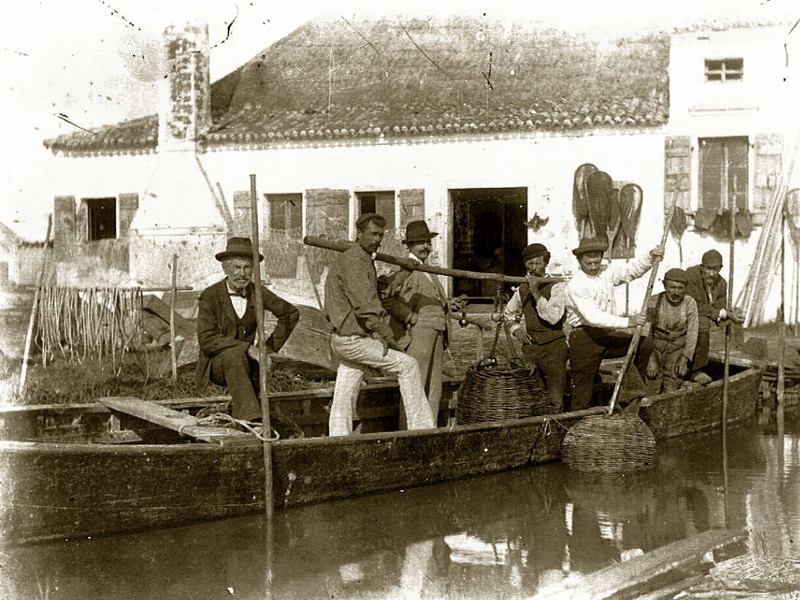- Rete Natura
- Man-
- Agrarian Reform
- Glossary
- Protected Areas
- Birdwatching
- History and Archaeology
- By Boat and on Horseback
- Slow Tourism in the Veneto Parks
- Green Tour - Greenery in Motion
- Water Museum Of Venice
- Download the APP
- Delta Slow
- Delta in Art+
- Cinema
- Letteratura
- Fotografia
- Pittura
- Musica
- Spettacolo
- Webcam
- Visite guidate
- Noleggio bici
- Escursioni a cavallo
- Escursioni in barca
- Escursioni in canoa
- Park Authority+
- Offices and Services
- Who we are
- Completed projects
- Where we are
- Notices and Announcements
- News Archive
- Plan of the Park
- Vas/Vinca
- Activities of the Technical Committee
- Transparent Administration until 22/11/2016
- Legal Notices
- List of Thematic Sites
- Authorisation Forms and Applications
Home » The Po Delta » Biodiversity » Man
History
Prehistory
The most ancient human settlements discovered in the province of Rovigo date back to the Bronze Age (18th-10th century BC) and are linked to Polada civilization. A characteristic feature of this culture is represented by the custom to build huts on wooden platforms, raised or directly resting on the ground, called pile dwellings or "bonifiche".The only example of pile dwellings in the province of Rovigo is the Canàr one, near San Pietro Polesine.
The Roman Age
The Roman conquest of Polesine was not marked by conflict, it was rather a slow absorption.
The Romans founded colonies in the Venetian territory (the first one was Aquileia in 181 BC), leaving a considerable autonomy to the local communities. An essential instrument for the Roman penetration was the building of a complex road network enabling the direct military control and the thorough diffusion of the culture of the new rulers. The apex of the economic and cultural vitality was reached in the 1st century AD.
In the 3rd century the territory suffered from the general political crisis of the empire, and, as a consequence, several town centers were abandoned. The occupation which followed in the 4th and 5th century had not the features nor the flourishing conditions characterizing the previous centuries. Shortly after, the fall of the empire and the consequent loss of a political and administrative power which could impose and organize the protection and safeguard of the banks of the main rivers and drainage channels led to the collapse of such an economic system. As a consequence, the lands were flooded, the valley areas became marshes and forests and wood began to grow.
From the Middle Ages to the Modern Age
After the Romans, the Byzantines went on with the work of maintenance of the channels and the water works; however, with the descent of the Longobards in the 6th century, a new period of decay began and the Delta recovered its natural aspect.
There are only a few remains of the medieval fortresses dating back to the period when the Estensi, Veneziani, Scaligeri and Ferraresi competed for the territory of the Delta.
Between the 9th and 10th century, the marshes of the Delta were the theater of the struggles between the towns of Comacchio and Venice, which fought for commercial reasons.
Serenissima won in 883 and 932, deporting the survivors and setting Comacchio on fire. In the two following centuries, after freeing themselves from the Exarchate of Ravenna, the Benedictine monks of Pomposa laid down the law in the Delta area.
After the so-called "Rotta di Ficarolo" in 1152, Signoria degli Estensi was able to expand to the Delta, engaging with Serenissima in the salt war (1482-1484). After the decline of the House of Este, the territories passed to the Papal State. The Venetian nobles invested great capitals in land cultivation and, cutting the river Po in 1604, they deviated the course of the river towards the south, for fear that it could bury the Venetian lagoon. The so-called Taglio di Porto Viro worked out the aspect of the Delta, transforming it in what we see today.
The 16th and 17th centuries were characterized by the building of palaces, villas, and rural courts which flourished in the 18th century. The Austrian invasion of the Delta, the siege of Ferrara, and the occupation of Comacchio took place in 1708. These towns remained under the Austrian control until 1725.
From the Unification of Italy until Present Times
Agrarian Reform
After the annexation of Veneto to Italy (1866) the Polesine area experienced a period of social and economic instability. After World War I, the flood of 1951 bent further on the local population: malaria and pellagra spread out.
The 60s, characterized by another flood (1966), experienced with theAgrarian Reform and reclamation activities the beginning of a general recovery which interested agriculture, vegetable growing, fishing, fish farming, trade and tourism and which enabled the area to enjoy a rich period.
© 2024 Ente Parco Regionale Veneto del Delta del Po
via G. Marconi, 6 - 45012 Ariano Polesine (RO)
Telefono +39 0426/372202 - FAX +39 0426/373035
Email: info@parcodeltapo.org
Certified mail: parcodeltapo@pecveneto.it
Telefono +39 0426/372202 - FAX +39 0426/373035
Email: info@parcodeltapo.org
Certified mail: parcodeltapo@pecveneto.it

- - - - - -




